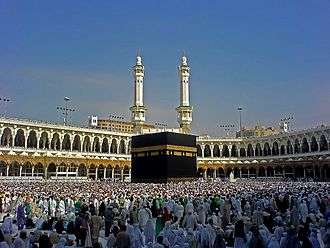Tashahhud
The Tashahhud (Arabic: تَشَهُّد, meaning the "testimony of faith"), also known as at-Tahiyyat (Arabic: ٱلتَّحِيَّات), is the portion of the Muslim prayer where the person kneels or sits on the ground facing the qibla, glorifies God, and greets the messenger and the righteous people of God followed by the two testimonials. The recitation is followed by an invocation of the blessings and peace upon the prophet known as Salawat.
| Part of a series on |
| Islam |
|---|
 |
|
Origins
There is a Hadith, thought to be authentic that states:[1]
Ibn Mas'ud is reported to have said that the Messenger of God (peace be upon him) taught me tashahhud taking my hand within his palms, in the same way as he taught me the chapter of the Quran, and we also read it after his passing away.
Sunni tradition
Hanafi and Hanbali
Sunni Muslims from both the Hanafi and the Hanbali schools of thought and the minority Ibadi sect recite the Tashahhud (attributed to Abdullah ibn Masud) as:
at-taḥiyyātu li–lāhi, wa-ṣ-ṣalawātu wa-ṭ-ṭayyibātu. as-salāmu ʿalayka ayyuhā n-nabīyu wa-raḥmatu -llāhi wa-barakātuhu. as-salāmu ʿalaynā wa-ʿalā ʿibādi -llāhi ṣ-ṣāliḥīna. ʾashhadu an lā ʾilāha ʾillā -llāhu wa-ashhadu ʾanna muḥammadan ʿabduhū wa-rasūluhū.
التَّحِيَّاتُ لِلّٰهِ وَالصَّلَوَاتُ وَالطَّيِّبَاتُ، اَلسَّلَامُ عَلَيْكَ أَيُّهَا النَّبِيُّ وَرَحْمَةُ اللهِ وَبَرَكَاتُهُ، اَلسَّلَامُ عَلَيْنَا وَ عَلَىٰ عِبَادِ اللهِ الصَّالِحِينَ، أَشْهَدُ أَنْ لَا إِلَٰهَ إِلَّا اللهُ، وَأَشْهَدُ أَنَّ مُحَمَّدًا عَبْدُهُ وَرَسُوْلُهُ[2]
This translates as: "Salutations to God and prayers and good deeds. Peace be upon you, O Prophet, and the mercy of God and his blessings. Peace be on us and on the righteous servants of God. I bear witness that there is no god but Allah, and I bear witness that Muhammad is His messenger."
Maliki
A variant attributed to Umar preferred by the Maliki school is:
At-taḥiyyātu li–lāh az-zākiyātu li–lāh aṭ-ṭayyibātu ṣ-ṣalawātu li–lāhi. as-salāmu ʿalayka ʾayyuhā n-nabīyu wa-raḥmatu -llāhi wa-barakātuhū. as-salāmu ʿalayna wa-ʿalā ʿibādi -llāhi ṣ-ṣalihīna. ʾashhadu ʾan lā ʾilāha ʾillā llāhu wa-ʾashhadu ʾanna muḥammadan ʿabduhū wa-rasūluhū.
التَّحِيَّاتُ لِلَّهِ الزَّاكِيَاتُ لِلَّهِ الطَّيِّبَاتُ الصَّلَوَاتُ لِلَّهِ السَّلاَمُ عَلَيْكَ أَيُّهَا النَّبِيُّ وَرَحْمَةُ اللَّهِ وَبَرَكَاتُهُ السَّلاَمُ عَلَيْنَا وَعَلَى عِبَادِ اللَّهِ الصَّالِحِينَ أَشْهَدُ أَنْ لاَ إِلَهَ إِلاَّ اللَّهُ وَأَشْهَدُ أَنَّ مُحَمَّدًا عَبْدُهُ وَرَسُولُهُ[3]
This translates as: "Blessed salutations, pure actions, good words and prayers to God. Peace be upon you, O Prophet, and the mercy of God and His blessings. Peace be on us and on the righteous servants of God. I bear witness that there is no god other than Allah and I bear witness that Muhammad is His servant and messenger."
Shafi'i
Another variant, attributed Ibn Abbas, preferred by Sunni Muslims belonging to Shafi'i school of thought, is:
at-tāḥīyyātu l-mubārakātu ṣ-ṣalawātu ṭ-ṭayyibātu li–lāhi. as-salāmu ʿalayka ʾayyuhā n-nabīyu wa-raḥmatu -llāhi wa-barakātuhu. as-salāmu ʿalayna wa-ʿala ʿibādi llāhi ṣ-ṣāliḥīna. ʾashhadu ʾan lā ʾilāha ʾillā -llāhu wa-ʾashhadu ʾanna muḥammadan rasūlu -llāhi.
التحيات المباركات الصلوات الطيبات لله، السلام عليك أيها النبي ورحمة الله وبركاته، السلام علينا، وعلى عباد الله الصالحين، أشهد أن لا إله إلا الله، وأشهد أن محمداً رسول الله[4]
This translates as: "Blessed salutations, prayers, good deeds to God. Peace be upon you, O Prophet, and the mercy of God and His blessings. Peace be on us and on the righteous servants of God. I bear witness that there is no god but Allah , and I bear witness that Muhammad is His servant and His messenger."
Shia tradition
.jpg)
Jafari
The Twelver Shias of the Ja'fari school recite the Tashahhud as:
أَشْهَدُ أَنْ لَا إِلَٰهَ إِلَّا ٱللَّٰهُ وَحْدَهُ لَا شَرِيكَ لَهُ، وأَشْهَدُ أَنَّ مُحَمَّدًا عَبْدُهُ وَرَسُولُهُ. ٱللَّٰهُمَّ صَلِّ عَلَىٰ مُحَمَّدٍ وَآلِ مُحَمَّدٍ.
ʾashhadu ʾan lā ilāha ʾillā -llāhu waḥdahū lā sharīka lahū wa-ʾashhadu ʾanna muḥhammadan ʿabduhū wa-rasūluhū. ʾallāhumma ṣalli ʿalā muḥammadin wa-ʾāli muḥammadin.[5]
"I bear witness that there is no deity but God, the One, there is no partner to Him, and I bear witness that Muhammad is His servant and His messenger. O God, send blessings upon Muhammad and the family of Muhammad."[6]
An alternative version:
أَشْهَدُ أَنْ لَا إِلَٰهَ إِلَّا ٱللَّٰهُ وَحْدَهُ لَا شَرِيكَ لَهُ وَأَشْهَدُ أَنَّ مُحَمَّدًا عَبْدُهُ وَرَسُولُهُ وَأَنَّ عَلِيَّ ٱبْنَ أَبِي طَالِبٍ أَمِيرَ ٱلْمُؤْمِنِينَ عَبْدُ ٱللَّٰهِ وَأَخُو رَسُولِهِ وَأَنَّ ٱلْأَئِمَّةَ ٱلطَّاهِرِينَ مِنْ وُلْدِهِ حُجَجُ ٱللَّٰهِ عَلَىٰ خَلْقِهِ. ٱللَّٰهُمَّ صَلِّ عَلَىٰ مُحَمَّدٍ وَآلِ مُحَمَّدٍ.
ʾashhadu ʾan lā ʾilāha ʾillā -llāhu waḥdahū lā sharīka lahū wa-ʾashhadu ʾanna muḥammadan ʿabduhū wa-rasūluhū wa-ʾanna ʿalīya -bna ʾabī ṭālibin ʾamīra l-muʾminīna ʿabdu -llāhi wa-ʾakhū rasūlihī wa-ʾanna l-ʾaʾimmata ṭ-ṭāhirīna min wuldihī ḥujaju -llāhi ʿalā khalqihī. ʾallāhumma ṣalli ʿalā muḥammadin wa-ʾāli muḥammadin.
"I bear witness that there is no deity but God, the One, there is no partner to Him, and I bear witness that Muhammad is His servant and His messenger, and that Ali ibn Abi Talib is the commander of the believers and the brother of His messenger, and that the pure Imams from his offspring are Allah's proofs upon His creatures. O God, send blessings upon Muhammad and the family of Muhammad."[7]
The Tashahhud is followed by the Taslim, also known as the Salam.
The bare minimum is to say "as-salamu ʿalaykum" (Arabic: ٱلسَّلَامُ عَلَيْكُمْ, lit. 'peace be upon you'). It is highly recommended, though, to add "wa-raḥmatu -llāhi wa-barakātuh" (Arabic: وَرَحْمَةُ ٱللَّٰهِ وَبَرَكَاتُهُ, lit. 'and God's mercy and blessings') .[5]
It is highly recommended, though, to recite
ٱلسَّلَامُ عَلَيْكَ أَيُّهَا ٱلنَّبِيُّ وَرَحْمَةُ ٱللَّٰهِ وَبَرَكَاتُهُ، ٱلسَّلَامُ عَلَيْنَا وَعَلَىٰ عِبَادِ ٱللَّٰهِ ٱلصَّالِحِينَ، ٱلسَّلَامُ عَلَيْكُمْ وَرَحْمَةُ ٱللَّٰهِ وَبَرَكَاتُهُ
as-salāmu ʿalayka ʿayyuhā n-nabīyu wa-raḥmatu -llāhi wa-barakātuhu, as-salāmu ʿalaynā wa-ʿalā ʿibādi -llāhi ṣ-ṣaliḥīna, as-salāmu ʿalaykum wa-raḥmatu -llāhi wa-barakātuhū.
"Peace be upon you O messenger of God, as well as God's mercy and His blessings. Peace be upon us and upon the righteous servants of God. Peace be upon you all, as well as God's mercy and His blessings."[5]
Zaidi
For the Zaidi, the middle Tashahhud after the second rakʿah is recited as:
Bismillahi wa Billahiwa alhamdulillahi wal-asmā`ul-husna kulluhā lillahi. Ashhadu an lā ilāha ila Allāhu wahdahu lā sharīka lahu wa ashhadu anna Muhammadan abduhu wa rasūluhu[8]
After the last rakʿah, the Zaidi recite the Tashahhud in its full formula:
Bismillahi wa Billahi wa alhamdulillahi wal-asmā`ul-husna kulluhā lillahi.[8](Or alternatively: At-tahiyyātu lillāhi was-šalawāt waŧ-ŧayyibātu.) Ashhadu an lā ilāha ila Allāhu wahdahu lā sharīka lahu wa ashhadu anna Muhammadan abduhu wa rasūluhu. Allāhumma salli ‘ala Muhammad wa āli Muhammad. Wa bārik ‘ala Muhammad wa āli Muhammad. Ka mā salayta wa bārakta ‘ala Ibrāhīm wa ‘ala āli Ibrāhīm. Innaka Hamīdun Majīd
Quranism
The minority Quranist sect reject the practice of Tashahhud as an innovation.[9]
References
- "Hadith – Asking Permission – Sahih al-Bukhari – Sunnah.com – Sayings and Teachings of Prophet Muhammad (صلى الله عليه و سلم)". sunnah.com. Archived from the original on 2017-11-15. Retrieved 2017-11-14.
- Bukhārī, nos 831, 835, 1202, 6230, 6265, 7381.
- Muwaṭṭa’, recension of Yaḥyā, no 240; recension of Abū Muṣ`ab, no 499; recension of Suwayd al-Hadathānī, no 161; recension of al-Shaybānī, no 146.
- Muslim, no 403.
- "Dialogue on prayer (1) – Jurisprudence Made Easy – The Official Website of the Office of His Eminence Al-Sayyid Ali Al-Husseini Al-Sistani". sistani.org. Archived from the original on 2016-04-24.
- "Tashahhud and Salam". Al-Islam.org. 2013-01-30. Retrieved 2019-05-22.
- "Ziarat of Imam Ali Ibn Abu Talib (as)". duas.org/.
- }} This aforementioned wording ("Bismillah wa Billahi...") does appear in Zaydi books of hadith such as the Musnad of Imam Zayd (as), Amaali of Ahmed bin Isa bin Zayd (as), Sharh at-Tajreed and other books of hadith with complete chains of narrators. Its legitimacy and authenticity does not depend on whether Sunni narrators report it or not. If you peruse the Sunni books of hadith, you will find variant wordings for the tashahhud. As for the Sunni reports that narrate some of the wording of the Zaidi tashahhud: The wording "Bimillah wa Billahi" on the authority of Jabir (ra) appears in Sunan an-Nisa`i and Al-Mustadrak. Imam Hakim authenticated the report. There is another wording that says: "Bismillahi wa khayr al-Asmaa." This is narrated from Umar in Al-Mustadrak and Al-Hakim said that it is authentic according to the criteria of Muslim. It also appears in the Sunan of al-Bayhaqi. There is also "Bismillah wa Billahi wa khayr al-Asmaa" narrated from Ibn Zubayr in the Mu'jam al-Kabeer and al-Mu'jam al-Aswat of at-Tabaraani.
- "True Islam – Salat Innovations". True Islam – Salat Innovations. Archived from the original on 2017-03-11. Retrieved 2017-11-14.
Reciting a prayer (called "At-Tahiyaat" or "Tashahud") during the Salat to commemorate Prophets Muhammad and Abraham and their families and friends! The Quran commands believers to dedicate their Salat and all worship practices to the name of God alone (6:162, 20:14). To praise or commemorate any other name during the Salat immediately invalidates the Salat and turns it into an act of shirk. Reciting a corrupt Shahada during Salat: God gave us the correct Shahada (Testimony) in the Quran (3:18). The Quranic Shahada is the one uttered by God Himself, the angels and all those endowed with knowledge. The corrupt innovation of adding the name of Muhammad to the Shahada is once again, an act of shirk. This corrupt Shahada is uttered during the Salat when the Quranic Shahada should be recited instead.
